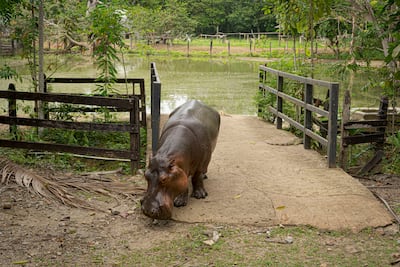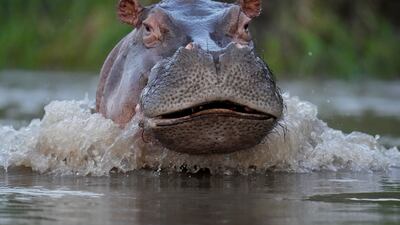The fate of 70 hippos that bred from animals that belonged to Colombian drug baron Pablo Escobar was looking a little brighter on Thursday, with many of the animals due to be relocated to sanctuaries abroad.
The problem authorities are still grappling with is the estimated $3.5 million cost of relocating the semi-aquatic mammals, which can live for up to 40 years.
About 150 hippos have roamed Antioquia department, where Escobar had a residence and bought a small number of the animals — by some accounts as few as four — in the late 1980s, before his death in a shoot-out with authorities in 1993.
The hippos were left to roam free in the highly suitable tropical and swampy environment, where their numbers started to soar, with many moving to the nearby Magdalena River.

Authorities said they planned to capture and move nearly half of the hippopotamuses in the coming months, with 10 bound for the Ostok Sanctuary in northern Mexico and 60 destined for an as-yet-unnamed facility in India.
“The whole operation should cost around $3.5 million,” said Ernesto Zazueta, owner of the Ostok Sanctuary.
Escobar was a notorious drug lord who rose to power in the 1970s and 1980s in Colombia, becoming one of the richest men in the world by controlling the drug trade, primarily cocaine, and by using extreme violence and intimidation to eliminate his competitors.
He is thought to be responsible for the deaths of thousands of people, including police officers, government officials, journalists, and civilians.
Along with sports cars and luxury villas, his vast drug empire allowed him time to pursue other interests, including setting up a private zoo with zebras, giraffes and flamingoes.
Anibel Gaviria, governor of the Colombian region that is home to the hippos, say they plan to use bait to lure the animals into pens, where they will remain confined before being put in special crates for the transfer.
Colombia had tried a sterilisation programme to control the hippo population, but it failed.
The environment ministry declared the hippos an invasive species last year, which opened the door to a potential cull.
But the hippo transfer plan is seen as a life-saving measure.
In the 1980s, the United States government began to focus on the drug trade as a threat to national security, and Colombia became a key target in the so-called war on drugs.
The US and Colombian governments worked together to dismantle Escobar's drug empire, but he was able to elude capture for years due to his vast resources and the loyalty of his followers.
In 1991, Escobar voluntarily turned himself in to the Colombian authorities, but continued to run his criminal enterprise from prison. In 1992, he escaped from prison and went into hiding, sparking an enormous manhunt that lasted for months.
In December 1993, Colombian authorities located Escobar in a safe house in Medellin, and a special police unit known as the Search Bloc was dispatched to capture him. After a tense stand-off, Escobar was shot and killed by the Search Bloc on December 2, 1993.

